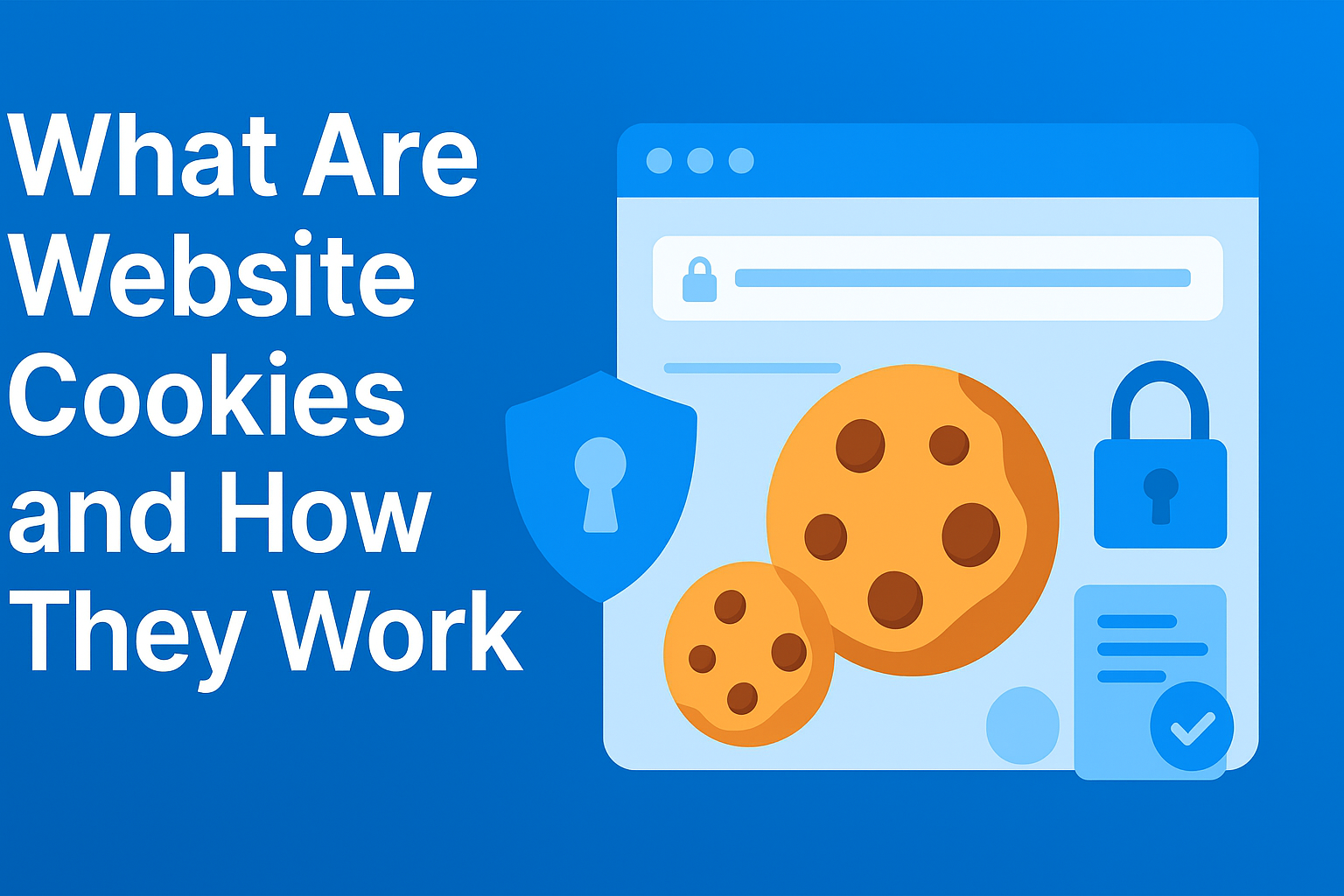What Are Website Cookies and How They Work (Complete Guide 2025)
Introduction
When you visit a website and see a pop-up asking you to “Accept Cookies,” have you ever wondered what that really means? Cookies are small but powerful tools that shape how the internet works. They help websites remember your preferences, keep you logged in, and personalise your browsing experience. However, cookies also raise important questions about privacy and data protection.
In this article, we’ll explore what website cookies are, how they function, their different types, and why understanding them is crucial for every internet user in 2025.
What Are Website Cookies?
A website cookie (or HTTP cookie) is a small piece of data that a website stores on your device — such as your phone, tablet, or computer — when you visit it. This data helps the website recognise you the next time you return.
For instance, when you log in to your email, the site uses cookies to remember your login session. That’s why you don’t have to re-enter your password every time you visit.
Technically, cookies consist of text strings that contain details such as:
- User ID or session ID
- Preferences (like language or theme)
- Browsing history or shopping cart items
- Authentication tokens
Cookies are managed through your web browser and can be accepted, blocked, or deleted manually by users.
Read also: Top Cybersecurity Threats Facing Nigerian Businesses in 2025
How Website Cookies Work
When you visit a website:
- The website’s server sends a cookie to your browser.
- Your browser stores it locally on your device.
- The next time you revisit that website, your browser sends the stored cookie back to the server.
- The server reads the cookie and uses its data to personalise your experience.
Example:
If you add items to your shopping cart but don’t check out, cookies ensure that the cart remains saved when you return later.
This smooth interaction improves convenience — but also allows websites to collect behavioural data, which can be used for analytics and advertising.
Types of Website Cookies
Not all cookies serve the same purpose. Below are the main types of cookies and what they do:
1. Session Cookies
- These are temporary and deleted once you close your browser.
- They help maintain your activity during a single visit — such as keeping you logged in as you browse multiple pages.
2. Persistent Cookies
- Stored on your device for a set period (days, months, or even years).
- They remember login credentials, preferences, and repeat visit data.
3. First-Party Cookies
- Created by the website you are visiting.
- Typically used for basic functionality like saving your preferences or tracking your cart.
4. Third-Party Cookies
- Created by external domains, such as advertisers or analytics providers.
- Used for targeted advertising, retargeting, and cross-site tracking.
5. Secure Cookies
- Transmitted only over HTTPS connections.
- Used to ensure data security during transactions, like online banking.
6. HttpOnly Cookies
- Not accessible via JavaScript, reducing the risk of hacking and cross-site scripting attacks.
Read also: How to Optimise On-Page SEO with AI: Boost Your Website Content in 2025
Why Websites Use Cookies
Cookies are essential to how modern websites function. Below are some major reasons why they’re used:
1. Personalisation
Cookies help websites tailor content based on user preferences — such as language, location, or display settings.
2. Authentication
They enable automatic login and session management for registered users.
3. Analytics and Performance
Websites use cookies to analyse traffic patterns, track visitor behaviour, and improve user experience.
4. Advertising
Cookies are vital for online advertising. They help brands show relevant ads based on user interests and browsing history.
5. E-Commerce Functionality
Online stores rely heavily on cookies to remember items in shopping carts, process transactions, and store order histories.
Privacy and Data Concerns
While cookies make browsing more convenient, they also raise data privacy concerns. Because cookies can track user behaviour across websites, they often collect sensitive information — sometimes without explicit consent.
This has led to the creation of strict data protection laws, including:
- GDPR (General Data Protection Regulation) — Enforces transparency and consent for cookie use in the EU.
- NDPR (Nigeria Data Protection Regulation) — Protects Nigerian users from unauthorised data usage.
- CCPA (California Consumer Privacy Act) — Grants consumers the right to opt out of cookie tracking.
These regulations require websites to:
*Disclose how cookies are used
*Obtain user consent
*Provide an option to reject non-essential cookies
How to Manage or Delete Cookies
Users have full control over cookies through their browsers. Here’s how you can manage them:
Google Chrome
- Go to Settings → Privacy and Security → Cookies and other site data.
- Choose between “Allow all cookies,” “Block third-party cookies,” or “Block all cookies.”
Mozilla Firefox
- Go to Settings → Privacy & Security → Cookies and Site Data.
- Clear existing cookies or set custom tracking permissions.
Safari
- Go to Preferences → Privacy → Manage Website Data.
- Delete cookies individually or all at once.
Microsoft Edge
- Go to Settings → Cookies and site permissions → Manage and delete cookies.
Managing cookies regularly ensures a balance between functionality and privacy.
Read also: How to Build a Free Website for Your Business in Nigeria (2025 Guide)
The Future of Cookies: What’s Next?
As privacy awareness grows, the future of cookies is evolving rapidly. Many browsers, including Chrome and Safari, are phasing out third-party cookies to protect user data.
This shift is giving rise to new technologies such as:
- First-Party Data Tracking – Businesses rely more on direct user relationships.
- Privacy Sandbox by Google – A set of tools that replaces cookies with privacy-friendly ad targeting methods.
- Server-Side Tracking – Analytics handled securely on servers rather than browsers.
These innovations mark a turning point where user privacy and personalised experience must coexist.
Conclusion
Website cookies are an invisible yet vital part of our online experience. They make browsing smoother, more personal, and more efficient. However, they also bring privacy challenges that demand transparency and user control.
As regulations evolve and technology advances, the way cookies work will continue to change. The key takeaway is balance — websites must respect user privacy while offering personalised experiences.
Understanding what cookies are and how they operate empowers users to take control of their digital footprint and helps businesses maintain trust and compliance in the modern internet era.



